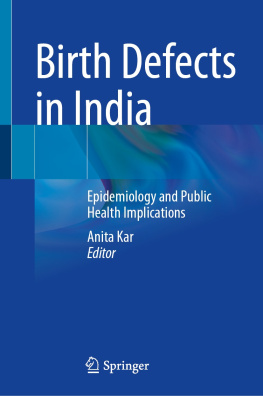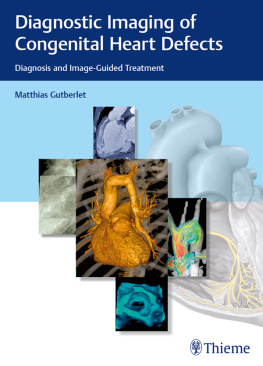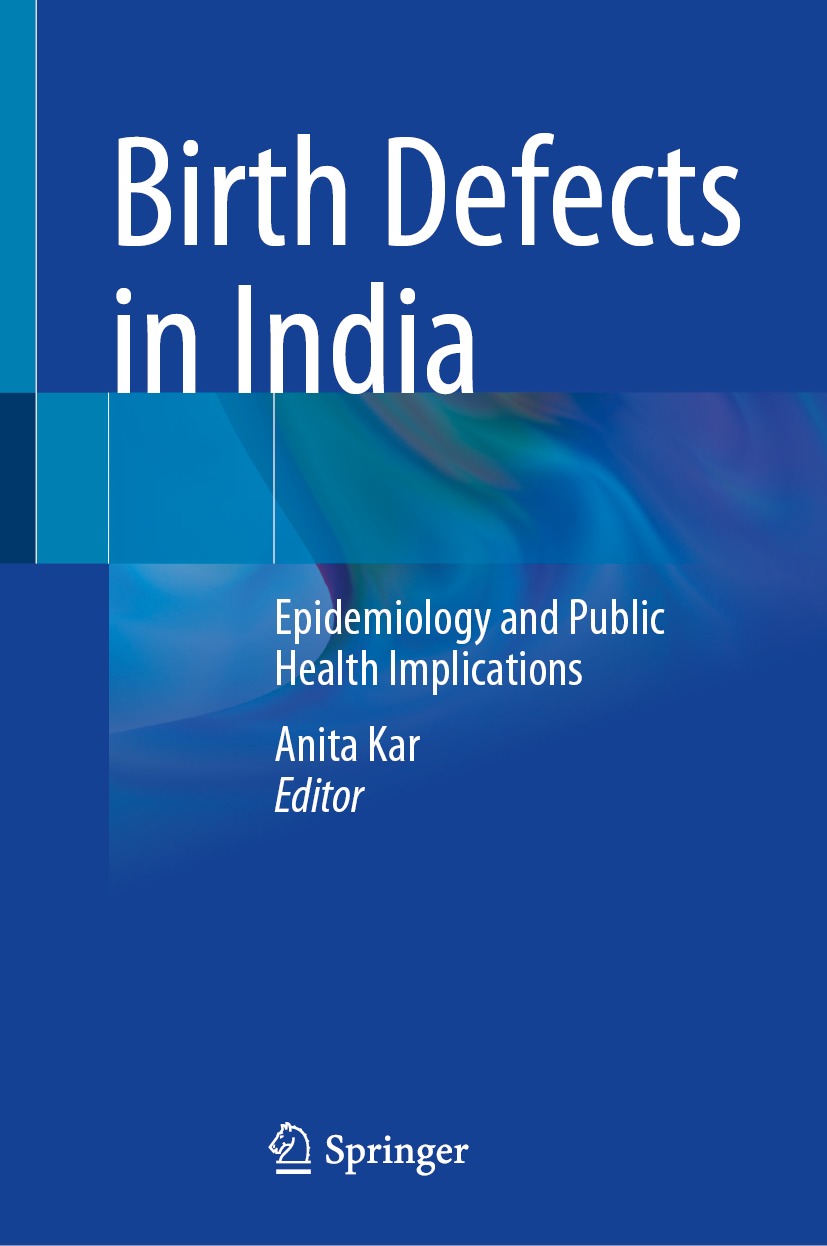Birth Defects in India
Epidemiology and Public Health Implications
1st ed. 2021

Logo of the publisher
Editor
Anita Kar
Birth Defects and Childhood Disability Research Centre, Pune, India
ISBN 978-981-16-1553-5 e-ISBN 978-981-16-1554-2
https://doi.org/10.1007/978-981-16-1554-2
Springer Nature Singapore Pte Ltd. 2021
This work is subject to copyright. All rights are reserved by the Publisher, whether the whole or part of the material is concerned, specifically the rights of translation, reprinting, reuse of illustrations, recitation, broadcasting, reproduction on microfilms or in any other physical way, and transmission or information storage and retrieval, electronic adaptation, computer software, or by similar or dissimilar methodology now known or hereafter developed.
The use of general descriptive names, registered names, trademarks, service marks, etc. in this publication does not imply, even in the absence of a specific statement, that such names are exempt from the relevant protective laws and regulations and therefore free for general use.
The publisher, the authors and the editors are safe to assume that the advice and information in this book are believed to be true and accurate at the date of publication. Neither the publisher nor the authors or the editors give a warranty, expressed or implied, with respect to the material contained herein or for any errors or omissions that may have been made. The publisher remains neutral with regard to jurisdictional claims in published maps and institutional affiliations.
This Springer imprint is published by the registered company Springer Nature Singapore Pte Ltd.
The registered company address is: 152 Beach Road, #21-01/04 Gateway East, Singapore 189721, Singapore
Preface
Across the world, over 8 million children are born with disabilities and chronic medical conditions caused by congenital anomalies (birth defects), genetic disorders and developmental disabilities. Birth defects like spina bifida, congenital heart defects, orofacial clefts and club foot; genetic disorders like muscular dystrophy and sickle cell anemia; and developmental disabilities like Down syndrome, cerebral palsy, intellectual disability and autism are commonly encountered in community and clinical settings. Ninety-five percent children with these conditions reside in low- and middle-income countries (LMICs). Despite the large numbers, birth defects and developmental disabilities are neglected childhood conditions, under-prioritized by public health services, especially in LMICs. Access to care is limited, so that survivors have a poor quality of life, while parents and caregivers encounter considerable financial expenditure and emotional distress in attempting to provide the best possible care.
Birth defects are unseen in global maternal and child health agendas, and not viewed as public health issues requiring immediate attention. Without the impetus of a global plan, birth defects are not perceptible in national health and social welfare programs of LMICs. Developing public health services for these conditions is a challenging task in resource-limited settings, as key public health activities of prevention, surveillance, medical care, physical rehabilitation, social support and community engagement activities have to be developed in the form of a multidisciplinary, integrated service. Industrialized country models cannot be exactly replicated in resource-constrained settings.
Research is crucial for guiding the development of low-cost birth defects service models in LMICs. Models that utilize existing program activities are relevant, as a birth defect service has to be delivered in the background of other, larger public health issues and considerable resource limitations. Data on the magnitude of birth defects and developmental disabilities, their epidemiology and trends, the medical, rehabilitation and social service needs, survival and quality of life of families, are indispensable in informing the health planning process. Health service models for prevention, surveillance and care need to be developed.
The goal of this book is to approach birth defects from a public health/health service perspective, focusing on essential public health functions and touching upon welfare activities that are essential to support the needs of children with disabilities and lifelong medical conditions. India has initiated services for birth defects, and this book examines and collates existing activities, in an attempt to understand the components that need to be put in place in order to develop a full-fledged service. The need for such a service is urgent, as data suggest that over 500,000 pregnancies are affected each year and around 50,000 newborns die from birth defect-related complications.
This book is intended for readers from the disciplines of public/global health, maternal and child health specialists and disability researchers and from related disciplines in the health sciences such as rehabilitation sciences, nursing and anthropology. Although written with India as a case study, the similarity in health system structure and functions should make it relevant to other LMICs. It is hoped that this public health perspective will bring about a discussion on birth defects as neglected maternal and child health issues, and the need for research to address the issue of childhood disability and chronic conditions, especially in LMICs.
Anita Kar
Pune, India
Acknowledgements
This book originates from the research studies of the contributing authors. Most of these studies were conducted in community settings, in the homes of children with birth defects, genetic disorders and developmental disabilities. The isolation of families, the lack of access to medical care and rehabilitation services, the lack of information and guidance, the exorbitant out-of-pocket expenditure and sometimes the questionable treatments were evident to the researchers. At the same time, the warmth of families, and their belief that the research would change their lives, forms the motivation for this book. The Editor and contributors would like to acknowledge all these families who, over two decades, have opened up their hearts and permitted the researchers to identify the essential components of a public health program that could substantially reduce the day-to-day challenges in their lives. The authors remain deeply indebted to all parents and caregivers and especially to the children, for their cooperation.
The Editor gratefully acknowledges parents who permitted the use of photographs and Dr. Ajay Meher, Dr. Md. Javed, Ariba Imtiaz, Dipthi Benoy, Bhagyashree Radhakrishnan, Trushna Girase and Dhammasagar Ujagare for sharing these photographs. The artwork provided by Kalyani Divgi is sincerely acknowledged.
The contributors would like to acknowledge several colleagues from non-governmental organizations, special schools and many clinicians and public health experts, who have collaborated and contributed to shaping these ideas.
The contributors gratefully acknowledge the authors and sources whose work has been cited in the text and regret their inability to cite all the scholarly work available in the field. The Editor is grateful to colleagues at the School of Health Sciences and the administration and support of Savitribai Phule Pune University where the research on birth defects was conducted. The research is now being continued at the Birth Defects Centre in Pune.









